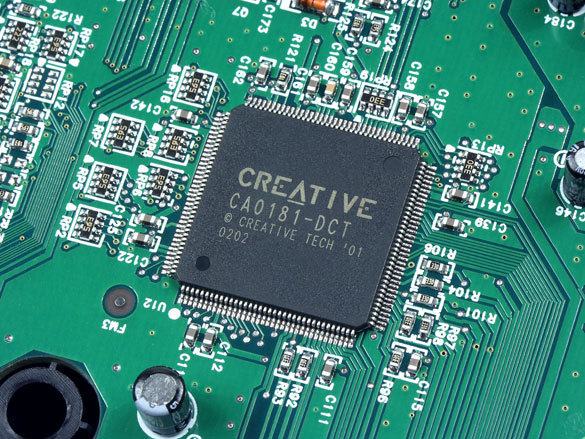External Sound: Creative Labs Extigy
Characteristics
The Extigy is built around Creative's DSP CA0181-DCT. This means that the chip is not wholly an Audigy creation, but a derivative thereof. The chip has been modified to operate via a USB connection and has been made lighter so that it can be supported by an IEEE1394. You can see that the size of the CA0181-DCT is less than half that of the chip in the Audigy. The equipment also contains another Creative Labs chip, the CA0180-IAG, as well as a Philips UDA 1328T chip, which is also found inside the Audigy.
The Extigy has a pretty wide range of capabilities. On the other hand, as has been explained above, support for 24 bit / 96 kHz sound is relative. The Extigy cannot actually read or record a sound file of that quality, or even work on it. The only task that can really be performed at 96 kHz is connecting to another peripheral via the S/PDIF input. All the components are, in fact, more or less compatible with 24 bits / 96 kHz, but in practice the Extigy is limited to 16 bits / 48 kHz. Recording and analog recovery are possible at 24 bits / 48 kHz, but in actual fact the processor downmixes to 16 bits and then upmixes back again.
On the MIDI side, the Extigy is much more limited than the Audigy. It does not officially support SoundFonts and is therefore not supplied with adequate software, but this system can still be used by means of the plugins available for CakeWalk and Cubase VST (these can be downloaded from www.livesynth.com or homepage.mac.com/bismark/ , respectively). The same applies to ASIO drivers that are not supplied in the package, although various unofficial drivers can be found at ici . Of course, you don't get great latency rates via the USB port. Creative has managed to reduce it to 40 ms, which isn't bad for a USB sound card.
The 32-track DirectSound 3D hardware support and the EAX 1.0 and 2.0, as well as the A3D 1.0, are valuable features. Note that the Extigy, unlike the Audigy, does not support multi-environment management. As a reminder, here is a list of functions supported by the first two versions of the EAX:
Get Tom's Hardware's best news and in-depth reviews, straight to your inbox.
